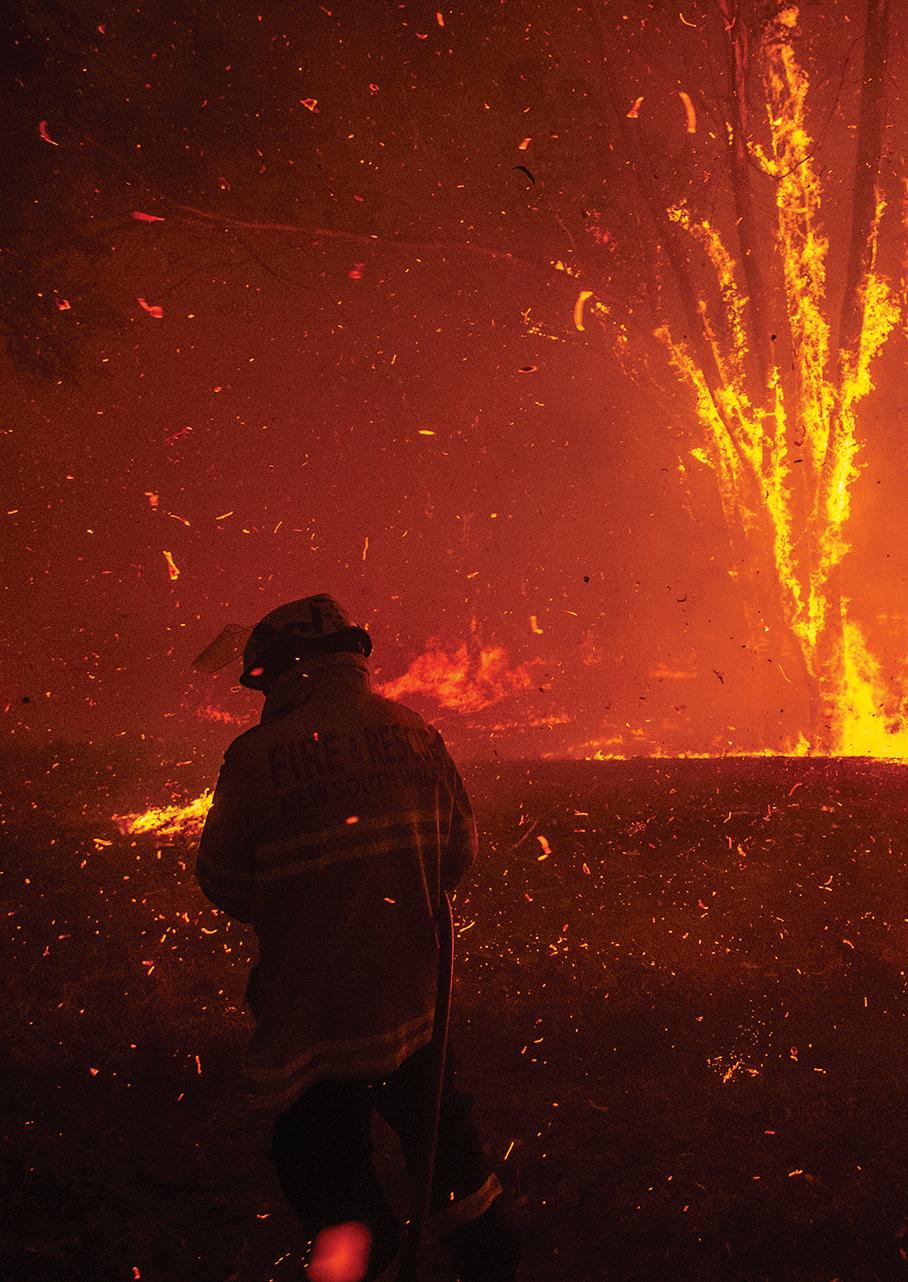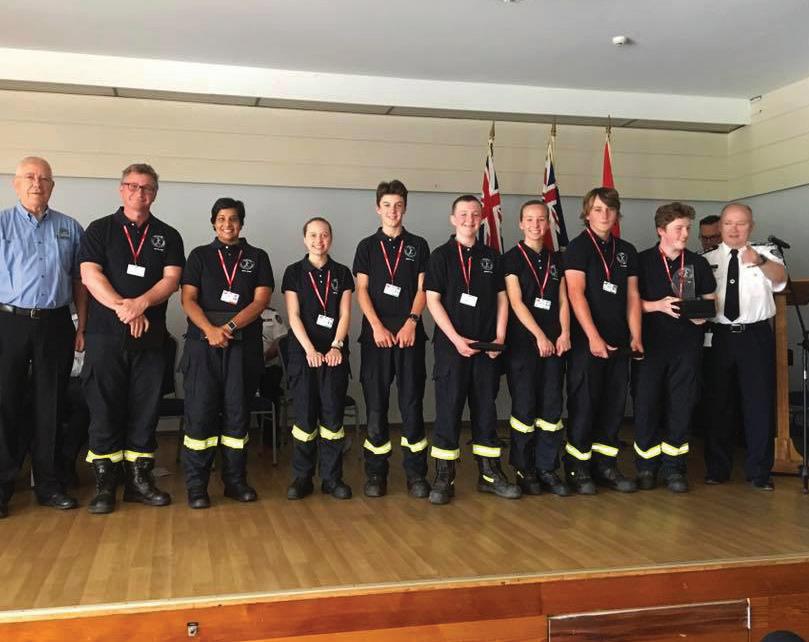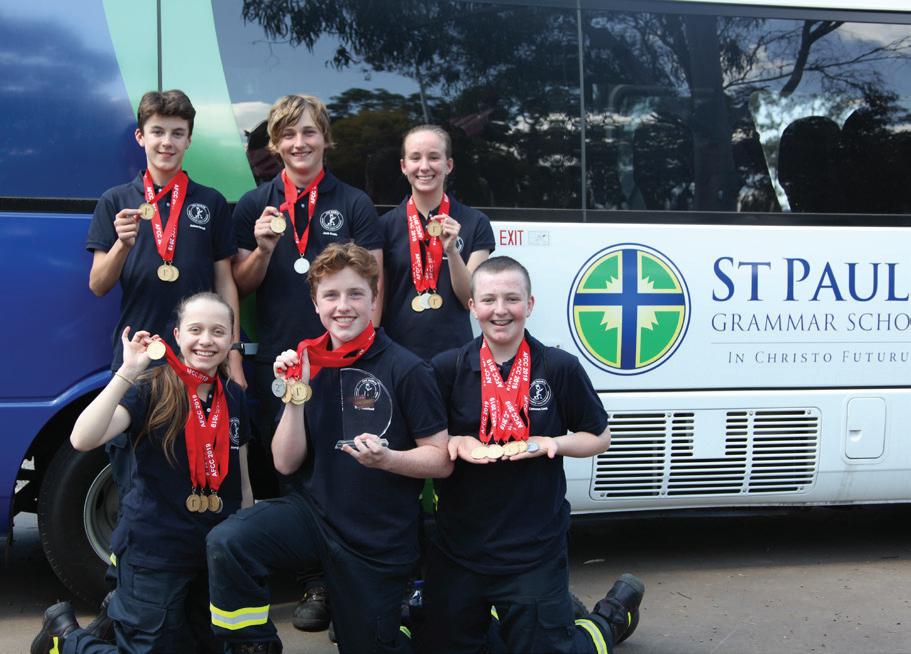
4 minute read
The 2019-2020 Summer Bushfire Crisis St Paul’s Cadet Rural Fire Brigade Programme
Events in the final months of 2019 and the opening chapters of 2020 were unprecedented.
St Paul’s stood with our local community in mourning the tragic loss of life, damage and devastation wrought by the 2019-2020 summer bushfire crisis, which engulfed much of the Australian east coast and beyond.
As a community, we stood in awe of the incredible volunteers and emergency workers who gave so much of themselves for such a long period of time, wherever and whenever they were called upon.
In late 2019, St Paul’s made the uncommon decision to close the school for a day following a ‘catastrophic’ fire warning issued by the Rural Fire Service. This proved to be a wise course of action as bushfire erupted only one kilometre from the school’s campus at Cranebrook.
The ceaseless efforts of our local bushfire brigades, particularly those from Castlereagh and Londonderry, saw the fire extinguished and the grounds of St Paul’s spared any damage, but many other individuals, businesses and communities were not as fortunate over these incredible months.
We acknowledge and thank members of our school staff, senior students and alumni who were involved in firefighting efforts as part of their local brigades.
With firefighting efforts and resourcing thrust into the national and international spotlight, the value of grassroots local initiatives like the St Paul’s Cadet Rural Fire Brigade programme were heavily emphasised. Providing a highly beneficial service learning experience and a potential springboard into local RFS brigades, the worth of this programme to students and the wider community is significant.
Peter Horan, St Paul’s Cadet Rural Fire Brigade Coordinator (and Secondary School teacher), spearheads the programme at St Paul’s and is currently overseeing a surge in popularity for this unique cocurricular opportunity, especially amongst Year 7 and 8 students.
How many students are in the St Paul’s Cadet Rural Fire Brigade?
In 2020, there are forty-five cadets - fifteen new cadets and thirty existing from last year. A large-scale renewal of the programme commenced in 2018 and the growth that started then has continued through to this year. Our younger Secondary School students have been working hard to fill the boots of departing senior cadets. As with any team rebuilding, outgoing students leave a hole to be filled, especially in terms of leadership
experience. In 2019, St Paul’s sent our most inexperienced team ever to the Australian Fire Cadet Championships – and they placed second!
Which members of staff are involved in the St Paul’s Cadet Rural Fire Brigade leadership team?
In 2020 the cadets are guided by a great staff team, including returning teachers Mark Linfoot and Mona Moon. We are also joined by Stephanie Paragalli and Laura Willet this year, together with St Paul’s alumni (graduate of 2018) and former cadet, Sam Keogh, who also currently works with the school’s maintenance team.
Additionally, the cadets are supported by two other groups who are critical to the success of the programme. The first being the amazing team of parents, grandparents and family members who always stand ready to assist our students. The second are the representatives from our local fire brigades at Castlereagh and Londonderry, who are so generous with their time, advice and resources.

When do the cadets meet/train?
In regular circumstances, the cadets undertake their training on Friday afternoons at St Paul’s, from 3:30pm to 5:00pm.
What percentage of cadets go on to serve in local fire brigades?
Typically around 20% of cadets move from the programme into local fire brigades. As most of our cadet brigade are in Years 7 and 8 at this stage, it will certainly be interesting to see whether they go on to seek membership in other brigades once they are eligible.
Currently the average age of volunteers in the fire services across Australia is quite high. A recent report from La Trobe University identified that 31% of volunteers were aged 55+ within the Queensland Fire and Emergency Services. The statistics are estimated to be similar in NSW. As such, it is vital that young people are introduced to the concept of volunteering.

Providing some training and introduction to the RFS goes a long way to building a connection with local brigades and the RFS in general. Students find joining a local brigade less daunting, as they have an understanding of how the NSW RFS operates and what to expect.

Regardless of whether a student goes on to join a local fire brigade or not, they still benefit greatly from the opportunity to take part in a challenging activity they would not otherwise get to do. Through simulations and drills, they experience and develop important teamwork, critical thinking and problem-solving skills.
WHAT’S NEXT FOR THE CADETS IN 2020?
The NSW RFS State Championships in September are still expected to go ahead, albeit in a different (and still to be determined) format. Always looking to improve, the cadets will be working hard to better their 2019 performance, which will be no mean feat!
With last summer’s bushfire season still fresh in their minds, the cadets are more motivated than ever. Perhaps more than any time in the past, students recognise the value and importance of the skills they are learning.











